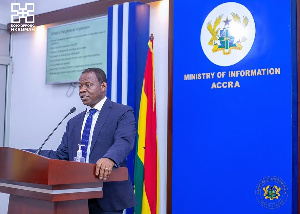The Ghana Health Service (GHS) has lost 525 of its skilled personnel and professionals to brain drain within the last 12 months, the Director-General, Dr Patrick Kuma Aboagye, has revealed.
To this end, he said the service had put in place a number of measures to mitigate the impact of the loss of these professionals on healthcare delivery in the country.
“Definitely we’ve suffered with the brain drain but looking at the numbers, in terms of absolute numbers we are not affected, we have lost experienced people, we have lost some skilled staff but we have also put in place measures to ensure that in the next two years we are able to replace them,” he said.
Dr Kuma Aboagye disclosed this in Accra yesterday when the GHS took its turn at the weekly briefings organised by the Ministry of Information.
He explained that the measures adopted to mitigate the effects of the brain drain phenomenon included, further training for staff, the recruitment of more nurses, stressing that “currently we have to recruit additional nurses and we have been able to send doctors to the rural areas.”
The Director-General said a total of 33,625 new staff including nurses had been recruited by the service to boost the capacity of the GHS to deliver on its mandate.
He said in pursuit of the attainment of universal healthcare by 2030, the service had developed a strategy to strengthen primary healthcare and deepen collaboration with its partners towards the redesigning of primary healthcare system in the country.
This, he said would lead to the improvement of quality and provide more patient-centred care in the country.
Dr Kumah Aboagye said the service had also improved on its supply chain system by making it visible in their buildings so that people see in real time where supplies were and where there were shortages to deal with.
He said the service had also managed to improve its E-health system by ensuring that the e-tracker which provided the service with real data and detailed data had also been introduced across the country.
“To improve the status of health, not just of adults but also adolescents and also our future leaders, we have introduced significant products to adolescent health and the last one is the Yolo programme which seeks to improve the health of adolescents and also reduce the risk posed to the two as they grow,” he emphasised.
Dr Kumah Aboagye said the service was continuously improving on its emergency response systems, and was effectively responding to emerging and re-emerging challenges
Source: ghanaiantimes.com.gh
 Home Of Ghana News Ghana News, Entertainment And More
Home Of Ghana News Ghana News, Entertainment And More





